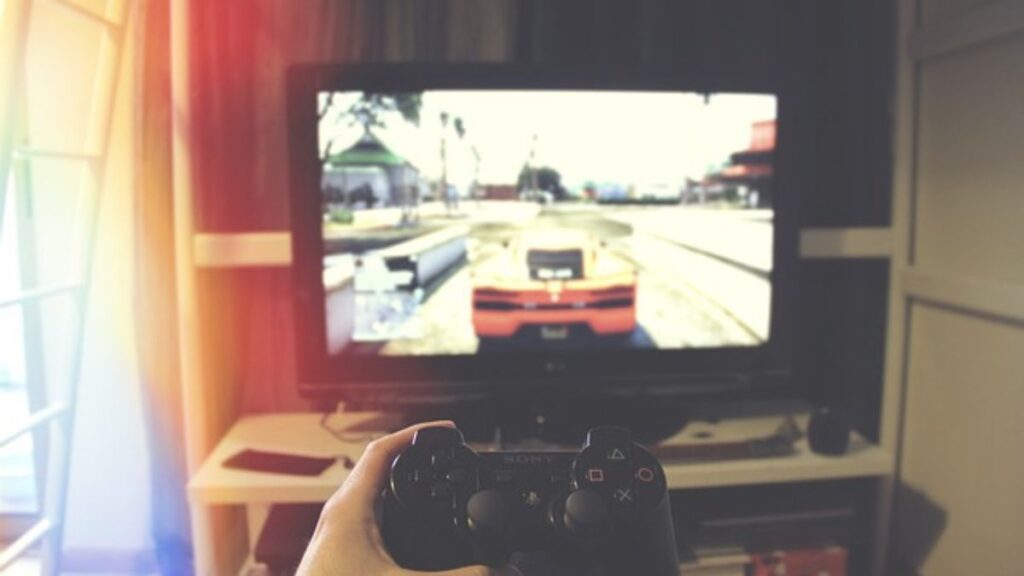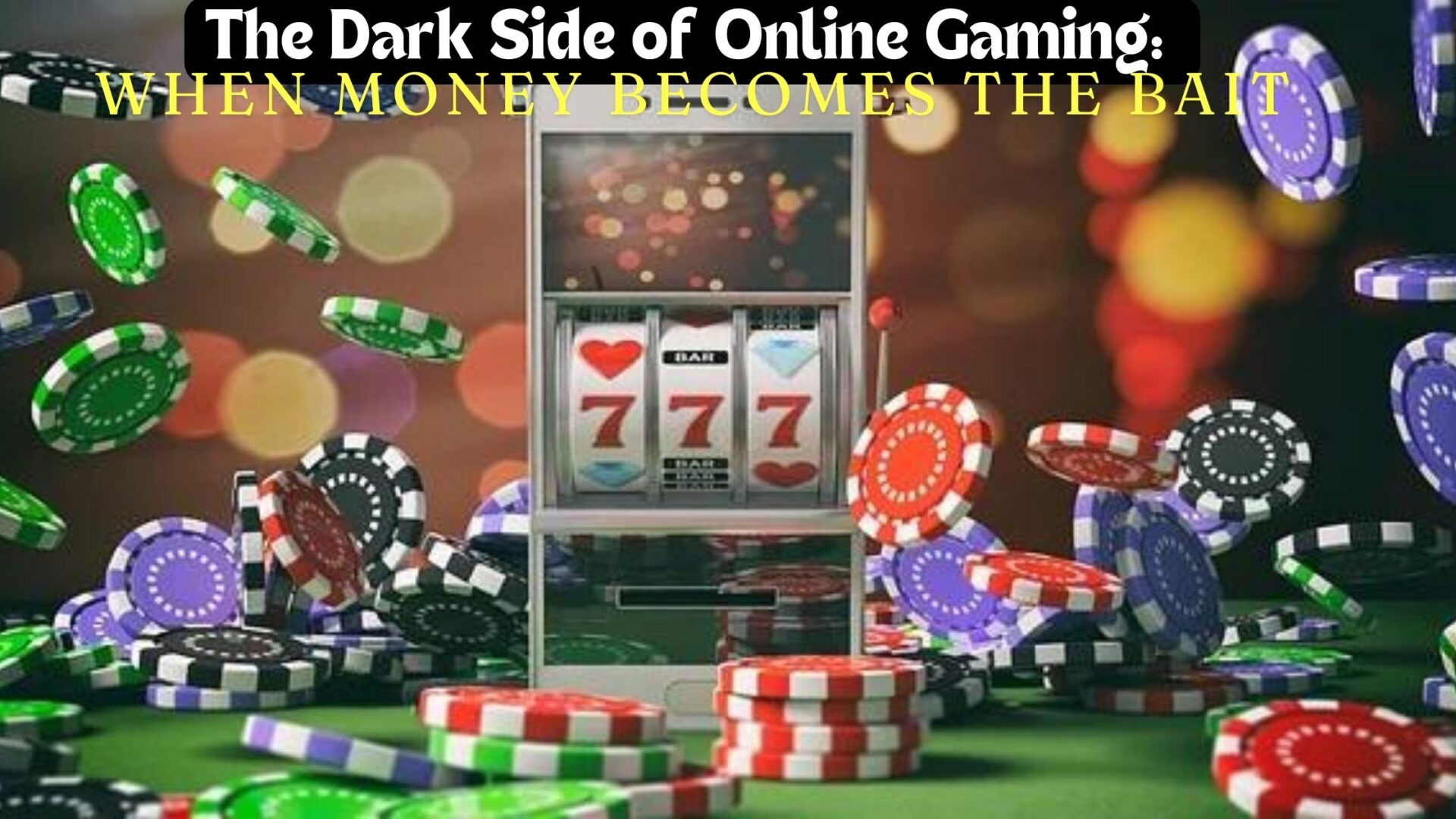Introduction:-
The Dark Side of Online Gaming: When Money Becomes the Bait

Online gaming has evolved into a multi-billion dollar industry, captivating millions of players around the world with its immersive experiences and competitive thrill. However, as the industry grows, so do the risks associated with it. One of the most concerning trends is the use of money as bait to lure players into potentially dangerous situations. This article delves into the dark side of online gaming, exploring how the promise of financial gain can lead to serious consequences.
The Dark Side of Online Gaming
Money is a powerful motivator, and game developers have increasingly incorporated financial incentives to attract and retain players. From cash prizes in competitive tournaments to in-game purchases that promise better performance, the lure of money is ever-present. While these financial incentives can enhance the gaming experience, they also pose significant risks.
Gambling Elements and Addiction
Many online games have incorporated elements of gambling, such as loot boxes and virtual casinos, where players can spend real money for a chance to win valuable in-game items. This can lead to a gambling-like addiction, especially among younger players who are more susceptible to these tactics. The thrill of potentially winning big can push players to spend more money than they can afford, leading to financial distress and addiction.
Fraud and Scams
The promise of easy money in online gaming also attracts scammers and fraudsters. Fake websites and malicious software can trick players into revealing personal information or making fraudulent transactions. These scams can result in significant financial loss and compromise personal security. Additionally, there are numerous instances of players being cheated out of their winnings in unscrupulous online gaming platforms.
Psychological Impact
The constant pursuit of financial gain in online gaming can have a detrimental impact on players’ mental health. The pressure to win, coupled with the disappointment of losses, can lead to anxiety, depression, and other mental health issues. The obsession with money can also cause players to neglect other important aspects of their lives, such as work, studies, and personal relationships.
The Impact on Young Players
Young players are particularly vulnerable to the dangers of money in online gaming. The lack of financial literacy and impulse control can lead them to make poor decisions, resulting in significant financial loss. Moreover, exposure to gambling-like elements at a young age can increase the risk of developing gambling problems in the future.
Regulatory Challenges
Regulating the use of money in online gaming is a complex issue. While some countries have implemented laws to protect players from gambling-related harms, enforcement can be challenging due to the global nature of online gaming. Moreover, the constantly evolving gaming landscape makes it difficult to keep regulations up to date.
Protecting Yourself and Your Loved Ones
To mitigate the risks associated with money in online gaming, it’s essential to take proactive steps. Here are some tips:
- Set a Budget: Determine how much money you are willing to spend on gaming and stick to it. Avoid chasing losses or spending more than you can afford.
- Educate Yourself and Others: Learn about the risks of online gaming and educate your children or younger siblings about responsible gaming practices.
- Use Secure Platforms: Only play on reputable gaming platforms that have strong security measures and transparent policies.
- Monitor Your Mental Health: Be aware of the signs of gaming addiction and seek help if you find yourself or a loved one struggling with the psychological impact of gaming.
- Report Scams: If you encounter fraudulent activity or scams, report them to the appropriate authorities to help protect other players.
In what ways do gambling elements in online games contribute to addiction, especially among younger players?
Gambling elements in online games, often referred to as “loot boxes,” “gacha mechanics,” or “microtransactions,” contribute to addiction in several significant ways, particularly among younger players. These elements can have a profound impact due to their psychological design, accessibility, and the demographic’s vulnerability. Here are some key ways these gambling elements foster addiction:

1. Psychological Mechanisms
- Random Rewards: Loot boxes and similar mechanics provide rewards on a random basis, akin to slot machines. This randomness can trigger the brain’s reward system, releasing dopamine and creating a cycle of anticipation and reward.
- Variable Ratio Reinforcement: The unpredictability of rewards, where players do not know when they will win something desirable, creates a compelling urge to keep playing or purchasing, hoping for a big payoff.
- Near-Miss Effect: Similar to gambling, near misses in loot boxes can increase the desire to continue playing, as players feel they were “close” to winning something valuable, prompting further spending.
2. Accessibility and Convenience
- Ease of Access: Online games are easily accessible through various devices, allowing young players to engage at any time, increasing the opportunity for frequent interactions with gambling elements.
- In-Game Purchases: The ability to make purchases within the game using real money or in-game currency facilitates impulsive spending, often without parental oversight.
3. Social and Competitive Pressures
- Social Influence: Peer pressure and the desire to keep up with friends or online communities can drive younger players to spend more on loot boxes to enhance their gaming experience or social standing.
- Competition: Competitive elements in games often reward players who spend more on loot boxes, creating an environment where spending is equated with success.
4. Marketing and Psychological Tactics
- Scarcity and Time-Limited Offers: Games often use tactics such as limited-time offers or exclusive items to create a sense of urgency, compelling players to make immediate purchases.
- Gamification of Spending: Some games gamify the spending process itself, providing achievements, progress bars, and rewards for spending money, which can mask the real cost and encourage further spending.
5. Vulnerability of Younger Players
- Underdeveloped Decision-Making: Younger players, particularly children and adolescents, have underdeveloped prefrontal cortices, which makes them more susceptible to impulsive behavior and less capable of critically evaluating the consequences of their spending.
- Lack of Awareness: Younger players often do not fully understand the value of money or the long-term consequences of gambling, making them more vulnerable to exploitative game designs.
6. Long-Term Behavioral Impact
- Desensitization to Gambling: Early exposure to gambling-like mechanics in games can normalize gambling behavior, potentially leading to gambling addiction later in life.
- Chasing Losses: The desire to recoup money spent on unsuccessful loot box purchases can lead to a dangerous cycle of spending more in an attempt to win back losses, a common trait in gambling addiction.
Mitigation Strategies
To mitigate these risks, there are several strategies that can be implemented:
- Regulation and Oversight: Governments and regulatory bodies can enforce stricter regulations on gambling elements in games, including transparency about odds and age restrictions.
- Parental Controls and Education: Educating parents and providing robust parental control tools can help manage and monitor in-game spending.
- Game Design Changes: Game developers can adopt ethical design practices, such as removing or limiting loot boxes and providing alternative means of progression and reward that do not involve gambling elements.
In conclusion, the incorporation of gambling elements in online games leverages psychological principles that can significantly contribute to addiction, especially among younger, more impressionable players. Addressing these issues requires a multifaceted approach involving regulation, education, and ethical game design.
What are the signs of gaming addiction, and where can individuals seek help if they or a loved one are affected?
Gaming addiction, also known as gaming disorder, is characterized by a range of behavioral symptoms that can significantly impact an individual’s daily life, mental health, and well-being. Recognizing the signs of gaming addiction and knowing where to seek help are crucial steps in addressing this issue. Here are the key signs of gaming addiction and resources for assistance:

Signs of Gaming Addiction
- Preoccupation with Gaming
- Constantly thinking about gaming, even when not playing.
- Planning the next gaming session and becoming irritable when unable to play.
- Loss of Control
- Inability to reduce or stop gaming despite attempts to do so.
- Spending increasing amounts of time playing games.
- Neglecting Responsibilities
- Ignoring personal, educational, or professional responsibilities in favor of gaming.
- Falling behind in school, work, or household duties.
- Interference with Daily Life
- Gaming interferes with daily activities, such as eating, sleeping, and personal hygiene.
- Skipping meals or sleep to continue playing.
- Social Withdrawal
- Withdrawing from family, friends, and social activities to spend more time gaming.
- Preferring virtual interactions over real-life relationships.
- Continued Use Despite Negative Consequences
- Continuing to play games despite experiencing negative effects, such as declining grades, strained relationships, or health issues.
- Ignoring the impact of gaming on physical and mental health.
- Using Gaming to Escape
- Using gaming as a means to escape from real-life problems or negative emotions, such as stress, anxiety, or depression.
- Deceptive Behavior
- Lying to family members or friends about the amount of time spent gaming.
- Hiding or minimizing gaming activities.
- Physical Symptoms
- Experiencing physical symptoms related to prolonged gaming, such as eye strain, carpal tunnel syndrome, or back pain.
- Neglecting exercise and physical health.
Seeking Help for Gaming Addiction
- Professional Counseling and Therapy
- Psychologists and Psychiatrists: Mental health professionals can provide counseling, cognitive-behavioral therapy (CBT), and medication if needed.
- Specialized Therapists: Seek out therapists who specialize in gaming addiction or addictive behaviors.
- Support Groups
- Online and In-Person Groups: Groups such as Online Gamers Anonymous (OLGA) provide support and community for individuals struggling with gaming addiction.
- Twelve-Step Programs: Modeled after Alcoholics Anonymous, these programs offer peer support and a structured approach to recovery.
- Rehabilitation Centers
- Residential Treatment Centers: Some centers offer programs specifically designed for gaming addiction, providing a controlled environment for recovery.
- Outpatient Programs: These programs offer treatment while allowing individuals to continue their daily activities.
- Hotlines and Helplines
- National Helplines: Many countries have national helplines for addiction, where individuals can receive immediate support and referrals.
- Crisis Text Lines: Text-based services offer confidential support for those in crisis.
- Educational Resources
- Books and Online Resources: Books on gaming addiction and online resources, including articles, forums, and videos, can provide valuable information and coping strategies.
- Workshops and Seminars: Attending workshops and seminars on gaming addiction can offer education and support for both individuals and families.
- Family and Peer Support
- Family Counseling: Involving family in the recovery process can provide a support system and improve communication.
- Peer Support: Encouraging social activities outside of gaming can help rebuild real-life relationships and reduce reliance on gaming for social interaction.
Recognizing the signs of gaming addiction and seeking help are critical steps in addressing this growing issue. By reaching out to professionals, support groups, and utilizing available resources, individuals affected by gaming addiction can find the support they need to regain control and improve their quality of life.
What steps can parents and guardians take to educate young players about the risks of money in online gaming?
Educating young players about the risks of spending money in online gaming requires a proactive and multifaceted approach from parents and guardians. Here are several steps they can take to address this issue effectively:

1. Open Communication
- Discuss the Risks: Have open and honest conversations about the risks associated with spending money in online games, including the potential for addiction, financial loss, and exploitation.
- Set Clear Expectations: Explain family rules regarding gaming and spending, ensuring that children understand the consequences of violating these rules.
2. Education and Awareness
- Explain How In-Game Purchases Work: Help children understand the concept of in-game purchases, including what loot boxes and microtransactions are, and how they can lead to spending real money.
- Teach Financial Literacy: Educate children about the value of money, budgeting, and the importance of making informed financial decisions.
3. Set Limits and Controls
- Parental Controls: Utilize parental control features available on gaming platforms and devices to restrict or monitor spending and screen time.
- Spending Limits: Set up spending limits or require parental approval for any in-game purchases.
4. Monitor Gaming Activity
- Regular Check-ins: Regularly check your child’s gaming activities, including the time spent playing and any purchases made.
- Account Access: Maintain access to your child’s gaming accounts to monitor and control spending.
5. Promote Balanced Gaming Habits
- Encourage Other Activities: Promote a balanced lifestyle by encouraging participation in offline activities such as sports, hobbies, and family time.
- Set Time Limits: Establish and enforce time limits for gaming to prevent excessive play and ensure a healthy balance with other daily activities.
6. Model Responsible Behavior
- Lead by Example: Model responsible spending and gaming habits. Children are more likely to follow guidelines if they see their parents practicing what they preach.
- Share Personal Experiences: If appropriate, share personal experiences or stories about the consequences of irresponsible spending or gaming behavior.
7. Involve Them in Decision Making
- Set Budgets Together: Involve children in setting a budget for gaming-related expenses, teaching them how to manage and stick to it.
- Discuss Purchases: Before making any in-game purchase, discuss the reasons and benefits, helping children to evaluate whether it’s worth the cost.
8. Educate About Marketing Tactics
- Identify Manipulative Techniques: Teach children how to recognize manipulative marketing tactics used in games, such as limited-time offers, exclusivity, and fear of missing out (FOMO).
- Critical Thinking: Encourage critical thinking about why games offer certain deals and how they are designed to prompt spending.
9. Provide Resources and Support
- Educational Materials: Provide access to books, articles, and videos about responsible gaming and financial literacy.
- Professional Help: If necessary, seek professional help from counselors or therapists who specialize in gaming addiction or financial management.
10. Foster Open Dialogue About Mistakes
- Non-Judgmental Approach: Create an environment where children feel comfortable admitting mistakes without fear of harsh punishment, allowing for constructive conversations about responsible behavior.
- Problem-Solving Together: Work together to find solutions if problems arise, such as unauthorized spending or excessive gaming, emphasizing learning and improvement.
By taking these proactive steps, parents and guardians can effectively educate young players about the risks associated with spending money in online games. This approach not only helps prevent potential financial and psychological harm but also promotes healthy and responsible gaming habits that can last a lifetime.
Conclusion
While online gaming offers exciting opportunities and the chance to earn money, it is crucial to be aware of the associated risks. The dark side of online gaming, where money becomes the bait, can lead to addiction, financial loss, and psychological distress. By understanding these dangers and taking preventive measures, players can enjoy gaming responsibly and safely.
References
- King, D. L., & Delfabbro, P. H. (2018). Predatory monetization schemes in video games (e.g., ‘loot boxes’) and internet gaming disorder. Addiction, 113(11), 1967-1969. Link
- Zendle, D., & Cairns, P. (2018). Video game loot boxes are linked to problem gambling: Results of a large-scale survey. PLoS ONE, 13(11), e0206767. Link
- Griffiths, M. D. (2019). The psychology of online gaming: The impact of financial rewards. Journal of Gambling Studies, 35(3), 795-811. Link
- Wardle, H. (2020). The emerging risks of online gaming: Financial and psychological consequences. British Medical Journal, 370, m2613. Link
- Gainsbury, S. M., Russell, A., King, D. L., Delfabbro, P., & Hing, N. (2017). Migration from social casino games to gambling: Motivations and characteristics of gamers who gamble. Computers in Human Behavior, 71, 59-67. Link
